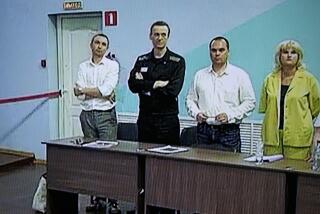Roman Polanski faces months behind bars as extradition battle unfolds
ZURICH, SWITZERLAND — Gone are the red carpet and the luxury accommodations, at least for a while. Film director Roman Polanski will probably remain in prison for several months as he fights deportation to the U.S. in a 3-decade-old sexual assault case.
His Swiss attorney, one of the country’s top criminal lawyers, filed a request in court Tuesday that Polanski be set free while his extradition case winds its way through the judicial system.
But such releases are rare for nonresidents in Switzerland, who are generally deemed to be flight risks. And given the lengthy extradition and appeals process, Polanski faces jail time far in excess of the 42 days he spent behind bars in Los Angeles back when the charges against him arose.
“We are talking about three, four months easily,” said Peter Cosandey, a former prosecutor here with extensive experience in extradition cases. “If he’s not released on bail as requested by his lawyers, then he has to remain in prison.”
Exactly where Polanski is being held has been kept secret for security reasons, which is normal procedure in Switzerland. Diplomats at the Polish Embassy, who met with Polanski on Monday, declined to disclose his location “to not make it easier for paparazzi to find him,” Consul Marek Wieruszewski said in a telephone interview from Bern, the Swiss capital.
Polanski has both Polish and French citizenship. French diplomats have also been in contact with the director.
He is entitled to unlimited access to his high-profile Swiss lawyer, Lorenz Erni, and to consular officials. But beyond that Polanski is living the life of any other jailed suspect, confined to a single cell that he most likely has to himself and allowed an hour of outdoor exercise a day.
“He stressed that he’s being treated very well . . . with respect and even some sympathy to his situation,” Wieruszewski said. “Conditions are good.”
Polanski’s arrest Saturday night, while in Zurich to receive a lifetime achievement award at a film festival, has inspired impassioned debate across Europe and in North America.
Artists and members of the film world on both sides of the Atlantic have rallied behind him, demanding his release, as have government officials in France and Poland. A letter from the Polish and French foreign ministers to Secretary of State Hillary Rodham Clinton asking her to intervene in the matter was due to be delivered in Washington on Tuesday.
But public reaction has been mixed, with many Europeans aghast at support for a fugitive who fled the U.S. in 1978 in the face of charges that he plied a 13-year-old girl with alcohol and drugs and then had sex with her. The director pleaded guilty to having unlawful sex with the girl, but left the country before sentencing.
The U.S. has 40 days from the arrest to lodge a formal extradition request, a period that can be extended to 60 days if necessary. The Swiss Justice Ministry then has a week or two to examine the request. If authorities accept the request, Polanski can file a formal appeal in federal court, which would take another few weeks.
Convincing authorities that he ought to be released on bail in the interim would be tough.
“If he lived here in Zurich, worked here in Zurich, had his family here in Zurich, we could say OK, his center of life is in Switzerland, so there’s low probability that he will escape,” Cosandey said. As that’s not the case for Polanski, “the court will say that the danger of escaping is too high.”
The director does own a residence in the Swiss resort town of Gstaad, and his attorney in France, Herve Temime, raised the possibility that Polanski could be confined there instead of in prison.
“He has a chalet in Switzerland. He would naturally accept to be placed under house arrest,” Temime told reporters in Paris.
Erni, Polanski’s Swiss lawyer, did not return calls seeking comment.
Once an extradition request from the U.S. is submitted, Swiss authorities have little room to maneuver in ruling on it, Cosandey said. Under the extradition treaty, the hearing is largely an administrative matter, and as long as proper procedures are followed and administrative criteria satisfied, Switzerland has little choice but to grant the request.
The question of why Polanski was arrested now continued to puzzle many in Europe, because the director has gone in and out of Switzerland for years.
Guido Balmer, a Justice Ministry spokesman, dismissed speculation that Switzerland was trying to improve ties with the U.S. after a rocky period in the bilateral relationship. “There is no link to any other issue,” he said. “It’s a police matter, so there is no place for any politics.”
Media here have speculated that Swiss authorities approached the U.S. first with information that Polanski would be attending the film festival in Zurich.
Balmer said such a scenario was possible, but would be perfectly within the realm of usual cooperation between U.S. and Swiss law enforcement. He added that Polanski’s intention to come to Zurich was well publicized beforehand.
At Polanski’s meeting with Polish diplomats Monday, “he looked normal,” Wieruszewski said. The director also received a visit from his wife, actress Emmanuelle Seigner.
Wieruszewski said he was working with Swiss authorities to try to establish a way for Polanski to communicate with the outside -- for example, to contact the embassy if he wishes. As the defendant in an ongoing case, Polanski’s communications are restricted.
“I’m trying to explain that, in his case, the investigation was 30 years ago,” Wieruszewski said. “It doesn’t make sense. Not to give him a computer or the Internet, [but] let him communicate with his lawyer, his family or with the embassy.”
--
More to Read
Sign up for Essential California
The most important California stories and recommendations in your inbox every morning.
You may occasionally receive promotional content from the Los Angeles Times.










